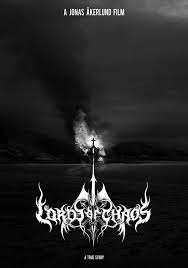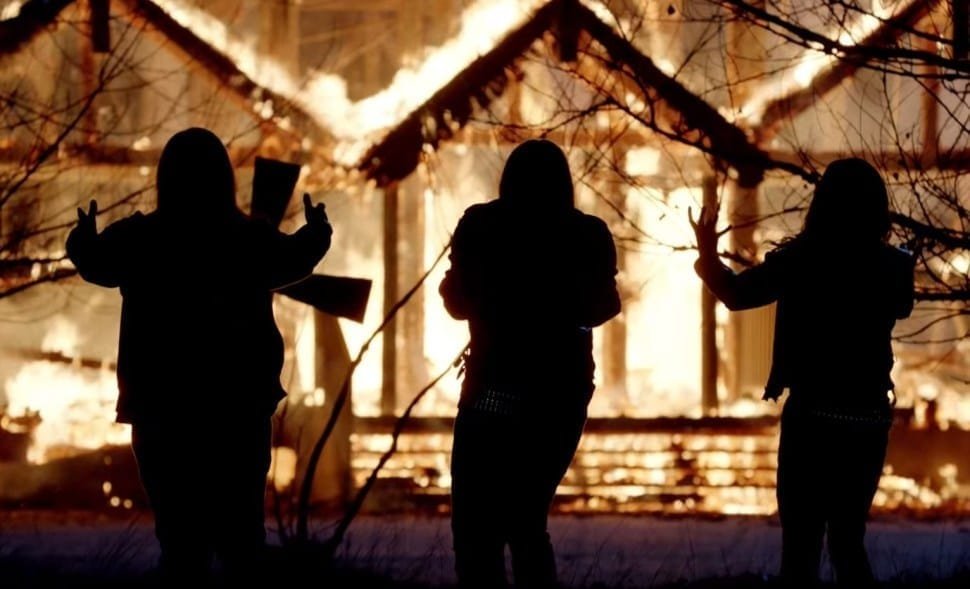
Whatever way you look at it, Michael Moynihan and Didrik Søderlind’s book Lords of Chaos: The Bloody Rise of the Satanic Metal Underground has been responsible for some serious myth-building in metal circles, not least in the minds of many of those involved in the spate of arson and violence which enveloped the emergent underground metal scene in Scandinavia in the early nineties. I’d go so far as to say that the book has even helped to shape what black metal has become. But it’s not a history which immediately leaps to mind as a prospective film, and I was surprised when I heard that a film loosely based on these events was in the pipeline. Evidently, though, this has been a troubled project, getting passed from director to director over a period of years, before finally landing with music video director Jonas Åkerlund. (Japanese enfant terrible Sion Sono was in the frame to direct for a while; I can only guess at what he could have done with this, and with respect to Åkerlund, I can’t help but feel sorry that I’ll never find out.) The resulting film is sure to divide metal fans, as it’s an often frustrating mix of high camp and unflinching violence – in trying to encapsulate a great deal, it positions itself rather awkwardly between tragedy and farce.
I commented in another recent review that films which begin with their closing scenes – meaning we know from the start that the film will run full circle, back to this point – are risky ventures. With Lords of Chaos, there is never any question about how the story will end; even if you’re only vaguely familiar with events, you’ll know that Mayhem musician Øystein Aarseth, better known as Euronymous, was murdered at his Oslo apartment by sometime bandmate Kristian Vikernes, probably best known as Varg Vikernes. Thus culminated an escalating period of tension and aggression between the two men, their rivalry already spilling over into various criminal acts up until this point. Unusually, the film starts with, and returns to, the use of a voiceover – Euronymous (Rory Culkin) pointing out that things don’t exactly ‘end well’ for him. The film proper begins in the late eighties, with Euronymous’s first forays into playing metal, his influences, and his early years with Mayhem.
And here’s the film’s key flaw: its yawning tonal shifts. A lot of the scenes involving early band practices, these young men crafting their stage presences, and of course the ubiquitous metal! parties! are somewhere between This is Spinal Tap and Wayne’s World, all giddy excess and the standard stereotypes of metal fans as, well, a bit stupid and superficial. Which Euronymous and his band mates might indeed have been, at that age: I have no point of reference for Euronymous the man, having only really encountered him in print or in his music, so there’s little for me to go on personally, but I think Culkin does his best to try to sustain what’s pretty well documented about Euronymous – that, yes, he was self-important and interested in being as kvlt as possible, had a lot of theatre about him, but for all that, he was a key player in the development of the Norwegian black metal scene, and his record shop Helvete was a genuine hub of activity. So there’s a lot here which sends up these key players, pushing things towards comedy in places. And by the way, surely to God the director could have found some Scandinavian actors and still sold the film? The ‘bye, mom’ Americanisms really grate here. But then, in a beat, the film turns gratingly, horrifically nasty. Former Mayhem vocalist ‘Dead’ hangs cats, and one hangs from his ceiling for the duration; he slashes his arms and throat; his suicide scene is intensely graphic (he shot himself in the head) and – as with all the death scenes in this film – inescapably sad, particularly given Euronymous’s behaviour when he discovers his body (the film’s attempts to square this with him as an essentially decent guy fall flat, and don’t seem to be really rooted in reality, either). Lords of Chaos is akin to ordeal horror in places, then, and then breaks into parody in others; it’s a disorientating experience because of this, and it means that neither element really works. Even if the black metal of the day did have a bit of parody to balance its horror, it doesn’t work for creating a coherent narrative on screen.
I was, though, genuinely quite surprised at how pro-Euronymous the film is: the story is told largely from his perspective, the voiceover is his, and the story begins and ends with him. If you feel any sympathy for anybody here, then it’s engineered to be Euronymous. The book on which this is all based spends a lot more time unpicking (and let’s be honest, creating) the world views held by many of the people involved in the so-called ‘Black Circle’, giving a disproportionate amount of time and space to Varg Vikernes – who always claimed that he murdered Euronymous in self-defence, and has since served the maximum jail sentence for the crime in Norway, before relocating to France. In the film, there’s no sense of reverence for him whatsoever: Vikernes gets an absolute drubbing throughout, so for anyone who wishes to see him painted as superficial, emotionally-challenged and yeah, as thick as mince, then look no further. (He gets a disproportionate number of sex scenes too, mind you, which I could have happily done without.)

The film works its way through its key plot points with an odd blend of a keen eye for detail and a few glaring errors (for example, Euronymous had no time for life-affirming thinkers like Crowley and La Vey, yet there they are, their pictures pinned to his noticeboard). But one thing I feel the film did more or less miss out is the sense that the safe, secure, prosperous Scandinavian life enjoyed by these young men probably conspired to bore them to tears, and it always feels like a factor in the powder-keg they went on to create. But then, that’s just my take: ask twenty metal fans what they would want to see from this film, and you’ll get at least twenty different answers. I suspect at least a few of them wouldn’t want the film made at all.
I suppose my overarching sentiment, having finally caught up with Lords of Chaos, is bewilderment at how this plays out. Åkerlund has considerable prowess making music videos, but he’s struggled to make this feature work; trying to represent what’s essentially a pretty grotty history in any meaningful way over a two-hour running time would challenge anyone, not least someone who doesn’t usually work with the format. There are some well-observed scenes here, and it can’t have been easy to try and capture these ‘interesting times’ on film, but overall Lords of Chaos doesn’t work well. Maybe the tangle between truth and lies acknowledged by the film has just become too inextricable – even too unwieldy – by this point.
